|
|
|
Sort Order |
|
|
|
Items / Page
|
|
|
|
|
|
|
| Srl | Item |
| 1 |
ID:
163231
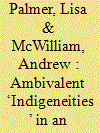

|
|
|
|
|
| Summary/Abstract |
Successfully achieving nationhood under the banner of what Anderson (2003) terms ‘aggregated nativeness’, Timor‐Leste is southeast Asia's newest nation. Yet as Anderson asserts ‘for the culture of nationalism … survival cannot be enough’ (2003: 184) and as with all other nationalisms, Timor‐Leste's nation‐making agenda is now engaged in the search for inclusive futures for its citizens. In this paper, we examine the extent to which Timor‐Leste's independence trajectory has included the active involvement of Indigenous Timorese traditions, practices and priorities in the governance of the new nation. By theorising these shifting ‘Indigenous’ ontologies and examining the ways in which they correspond (or not) with the tensions evident in more internationalised approaches to Indigeneity, we illuminate the socio‐political challenge of carving out spaces for plural identities and meaningfully diverse economic futures in Timor‐Leste. We argue that the term ‘Indigenous’ is not (yet) a term mobilised as a vehicle for the politics of recognition at either national or local levels of civil society.
|
|
|
|
|
|
|
|
|
|
|
|
|
|
|
|
| 2 |
ID:
108115
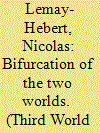

|
|
|
|
|
| Publication |
2011.
|
| Summary/Abstract |
Studies increasingly highlight the limits of state building conducted 'from the top-down'. Building on the literature and using a Rosenauian concept in a novel way, this article posits that international interventions create a 'bifurcation of the two worlds'. Departing from a study of Kosovo and Timor-Leste, the article posits that the massive arrival of staff involved in international governance will create a social gap between the international and the local 'worlds', which will in turn become a target of narratives of resistance by local actors. This bifurcation is exemplified by the 'white car syndrome', a concept representing the horde of white UN vehicles accompanying major interventions and developed in this contribution. Thus, the article attempts to shed new light on the legitimacy crises that Kosovo and Timor-Leste experienced at the beginning of the current century, while demonstrating and increasing the linkages between development studies and peace studies.
|
|
|
|
|
|
|
|
|
|
|
|
|
|
|
|
| 3 |
ID:
119053
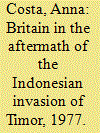

|
|
|
|
|
| Publication |
2013.
|
| Summary/Abstract |
This article fills a gap in the literature of international involvement in the aftermath of the Indonesian invasion of Timor-Leste by providing detailed documentary analysis of British conduct and motives. A substantial amount of scholarship has covered the role played by the United States and Australia during and after the Indonesian invasion of 1975. The lack of scholarly work specific to the role played by Britain during the first years of the Indonesian-Timorese conflict is regrettable as it represents a missing piece in the mosaic of international liability for one of the major massacres committed in the twentieth century. This omission has allowed the official British government version to survive, in which the country plays the role of an honest but ultimately unsuccessful broker working for a diplomatic solution between Indonesia and Portugal that would ensure the right to self-determination for Timor. The existing literature only offers a cursory challenge to this idea of British neutrality.
|
|
|
|
|
|
|
|
|
|
|
|
|
|
|
|
| 4 |
ID:
126939
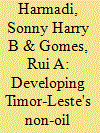

|
|
|
| 5 |
ID:
105238
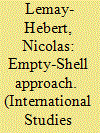

|
|
|
|
|
| Publication |
2011.
|
| Summary/Abstract |
State-building under the aegis of international administrations has faced various hurdles and obstacles in Kosovo and Timor-Leste-failures that came to full light in March 2004 in Kosovo and in May 2006 in Timor-Leste. However, the international conception buttressing the set up of international administrations-I dub it the "empty-shell" approach-is still present in certain policy circles. This article aims to analyze this international conception by clarifying how the UN came to impose its authority over the two territories in a very similar process. While the literature on each state-building experiment is vast and compelling, few authors have attempted to contrast the two case studies, especially regarding the mental conception informing the governance process of these territories since 1999. This article links the empty-shell approach with the delegitimization process that came to be experienced by the UN in both cases. The article describes the international policies put in place by the UN to expand its control over the two territories, a mix of co-option of local elites and the marginalization of the local population. Finally, the article reveals some possible solutions in order to avoid the more blatant difficulties pertaining to state-building conducted from the outside-in.
|
|
|
|
|
|
|
|
|
|
|
|
|
|
|
|
| 6 |
ID:
131696


|
|
|
| 7 |
ID:
120182
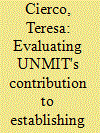

|
|
|
|
|
| Publication |
2013.
|
| Summary/Abstract |
Timor-Leste began the democratic transformation process in the beginning of this century with a heavy past legacy of external domination. Since then, it has been experiencing many difficulties in its path towards democracy especially in what concerns one critical issue: the respect for the rule of law. Focusing on two important pillars of the rule of law-justice and security-this paper seeks to understand why has been so difficult to establish the rule of law in Timor-Leste.
The article initially provides a generic picture of the rule of law as an important dimension of the United Nations peacekeeping operations. It also aims to outline the United Nations Integrated Mission in Timor-Leste (UNMIT) capacity in strengthening the processes of peacebuilding and reforms in Timor-Leste, as well as on ensuring the credibility and integrity of institutions, such as the courts and the national police, which are serious challengers to the country's future. It concludes by providing some thoughts that can help to determine whether Timor-Leste is ready to look after its own security after 2013.
|
|
|
|
|
|
|
|
|
|
|
|
|
|
|
|
| 8 |
ID:
139439
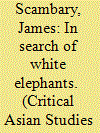

|
|
|
|
|
| Summary/Abstract |
A little more than a decade after independence, the small island state of East Timor is exhibiting the hallmarks of a neo-patrimonialist state. Since 2008, utilizing its considerable oil reserves, the government has embarked on a major infrastructure development program. However, despite a complex regulatory regime to safeguard the quality and transparency of spending, these systems have been routinely bypassed by executive-style decision making and a variety of informal and sub-legal devices. Public funds have been channeled to clientelist networks via often controversial infrastructure projects or state employment. This article details the emergence of this state and explains how a command style of government and complex systems of reciprocal obligation embedded in an array of parallel, informal networks have undermined the foundations of a Weberian rational-legal state, with critical consequences for development and stability.
|
|
|
|
|
|
|
|
|
|
|
|
|
|
|
|
| 9 |
ID:
117199
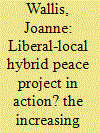

|
|
|
|
|
| Publication |
2012.
|
| Summary/Abstract |
The liberal peace project has dominated state-building operations since the end of the Cold War, including in Timor-Leste. However, the attempt to institutionalise the liberal peace faced significant challenges in Timor-Leste's fragmented subsistence-based society. This resulted in the creation of shallowly rooted and poorly-understood liberal state institutions that were disconnected from the majority of Timorese, who continued to follow their local sociopolitical practices. In response, the state has increasingly engaged with these local practices in order to create state institutions that make sense to the people they seek to govern. This engagement has occurred through the formalisation of local sociopolitical institutions, the recognition of local justice systems and the utilisation of local ceremonies and practices. Therefore, this article argues that a liberal-local hybrid peace project has emerged to guide state-building in Timor-Leste, which may indicate how similar projects could develop in the future.
|
|
|
|
|
|
|
|
|
|
|
|
|
|
|
|
| 10 |
ID:
123518
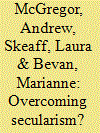

|
|
|
|
|
| Publication |
2012.
|
| Summary/Abstract |
The Catholic Church has played a key role in the development of Timor-Leste since Dominican friars first began trading with the Timorese in the 16th century. Religious networks and spaces have been essential in delivering development services, while Catholic theologies have shaped how development is pursued and understood. In this paper we outline the changing contribution and character of the Catholic Church through three periods of Timor's tumultuous history-during colonialism, under Indonesian occupation and through independence-with a greater focus on the latter stages. We present the Timorese Church as a heterogeneous organisation that responds in both progressive and conservative ways to the socio-political contexts in which it is embedded. Our aim is to highlight the diverse religious development geographies that exist in Timor-Leste but which are marginalised within contemporary development planning and policy. Drawing upon post-development theory and performative research, we encourage debate about the role of religious institutions in inspiring 'alternatives-to-development'.
|
|
|
|
|
|
|
|
|
|
|
|
|
|
|
|
| 11 |
ID:
123995
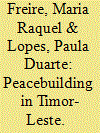

|
|
|
|
|
| Publication |
2013.
|
| Summary/Abstract |
This article highlights the importance of interaction between peace missions and local dynamics, drawing on Tsing's work on frictions. It is centred on the United Nations (UN) peace intervention in Timor-Leste, discussing different examples of frictions, which have the potential to undermine or empower the peacebuilding efforts underway. The analysis stresses the unpredictable effects of applying the UN liberal peace model. It is argued that processes of friction, often consisting of an incremental build-up of intermediate results shape and form the (un)sustainability of any peacebuilding process initiated by an external intervention and, consequently, should be identified and analysed in order to enhance or minimize their positive/negative contribution towards building peace.
|
|
|
|
|
|
|
|
|
|
|
|
|
|
|
|
| 12 |
ID:
114975
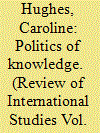

|
|
|
|
|
| Publication |
2012.
|
| Summary/Abstract |
A new casting of diasporas, exiles and returnees as potentially transformative agents in post-conflict polities is the topic of this article. 'Return of Qualified Expatriates' programmes have recently been launched by international agencies in a number of post-conflict countries in an attempt to promote better capacity-building within post-conflict states institutions. This article argues that the ostensible technical orientation of these programmes is misleading, and they have a political significance which is noted and contested locally. In political terms, they represent attempts to smuggle Western hierarchies of knowledge into post-conflict reconstruction efforts under the cover of ethnic solidarity, to the detriment of local participation and empowerment. The article argues further that this is always contested by interested parties locally, often by mobilising alternative capacities, labelled 'authentic', in opposition. As such, strategies that attempt to use ethnic ties to overcome this local contestation are placing a significant burden on ethnic categories that are slippery, malleable and contested in post-conflict contexts. These points are demonstrated with reference to the cases of Cambodia and Timor-Leste.
|
|
|
|
|
|
|
|
|
|
|
|
|
|
|
|
| 13 |
ID:
187172


|
|
|
|
|
| Summary/Abstract |
Two decades since its violent birth, Southeast Asia’s newest nation is stable and at peace with its neighbors, but domineering elder statesmen and reliance on oil revenue raise concerns.
|
|
|
|
|
|
|
|
|
|
|
|
|
|
|
|
| 14 |
ID:
113745
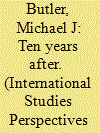

|
|
|
|
|
| Publication |
2012.
|
| Summary/Abstract |
A decade after achieving independence, the Democratic Republic of Timor-Leste (DRTL) continues to rely upon the United Nations (UN) directly and indirectly to carry out functions typically ascribed to the state. This dependency raises the specter of what scholars concerned with the breadth and extent of recent and ongoing UN operations in places such as Timor-Leste have dubbed "neo-trusteeship." This research advances an empirical accounting of, and explanation for, the emergence and persistence of neo-trusteeship in Timor-Leste. Careful scrutiny of the UN involvement in Timor-Leste betrays the origins and sources of the neo-trusteeship arrangement and suggests that neo-trusteeship is better understood as a by-product of the disjuncture between mandate overreach and organizational incapacity playing out within complex post-conflict environments rather than any intentional manifestation of "post-modern imperialism."
|
|
|
|
|
|
|
|
|
|
|
|
|
|
|
|
| 15 |
ID:
103645
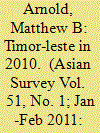

|
|
|
|
|
| Publication |
2011.
|
| Summary/Abstract |
Timor-Leste in 2010 continued to stabilize following the political and social crisis of 2006-08. With strong economic growth and a calm security situation, the year was defined by twin national debates that will dominate the country's long-term future: how to manage its significant energy resources and how best to use the accruing wealth.
|
|
|
|
|
|
|
|
|
|
|
|
|
|
|
|
| 16 |
ID:
114738


|
|
|
|
|
| Publication |
2012.
|
| Summary/Abstract |
This article seeks to elucidate many of the avoidable difficulties that the United Nations (UN) face when intervening in a given conflict. The article begins with a review of the UN's capability to act, fund, cooperate, and coordinate in peacekeeping missions. The UN's capability to respond to conflict is, in theory, boundless; however, it is limited by the realities of operating within the UN's vast bureaucracy and the possibility of member states having competing national interests. The article then proceeds with an analysis of the UN involvement in Timor-Leste, focusing first on the United Nations Mission in East Timor - the referendum monitoring mission - and then covering larger operations such as the United Nations Transitional Administration in East Timor and the United Nations Mission of Support in East Timor, and finally analyzing more recent missions: the United Nations Office in Timor-Leste and the ongoing United Nations Integrated Mission in Timor-Leste. The article concludes that the UN's performance is dependent upon a steady commitment to supplying resources and the ability to properly assess and appropriately respond to specific realities within the context of a peacekeeping operation.
|
|
|
|
|
|
|
|
|
|
|
|
|
|
|
|
|
|
|
|
|